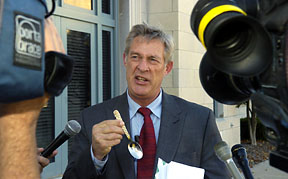Time for a quick spin through the front pages and their treatment of the big news from Iraq. See if you can see a pattern developing here.
First, a couple of awards. In the How Much Hed Space Can You Occupy and Still Say Nothing category, step forward the Montgomery Advertiser:
Saddam's fate may change nothingAnd then again, it may, um ... change
something! Would there be a fate we should be discussing here? Just wondering.
Runner-up on the "huh" front, the Modesto Bee:
Saddam's fate a further divideNow, the coveted You Provide the Pictures Award for tabloid jingoism: the New York Daily News in a walk:
NEXT STOP, HELL!Guys? Remember? No travel bookings on behalf of the Unseen Powers? The copydesk never screws around with the supernatural. The supernatural might screw back.
Runner-up and recipient of the Roger Miller Prize, the Miami Herald:
saddam hussein verdictHANG HIMNow the lesser awards, falling into a couple categories. One is mistaking intent for outcome, which we see often enough in local stories. Here it's kind of, well, guesswork:
Saddam bound for the gallowsFresno Bee
Saddam to hang for killingsThe Day (CT)
Saddam to hangColumbus Dispatch
Then there's the usual irrelevant speculation:
Verdict could fuel civil strife in IraqOrlando Sentinel
... and timeless observation:
Ex-Iraqi dictator belligerentThanks, Denver Post! We've been waiting since, oh, September 1980 for the definitive word on that.
Raleigh sounds as if it's rewriting one of those Bonnie and Clyde poems:
For Saddam, death;for Iraq, more strifeSounds so
heavy until you, like, read it. Side note, though:
Reactions from around the world: In the U.S./In the Muslim worldHmm. N&O having a little trouble figuring out the difference between Arabs and Muslims again? Let's work on that.
OK. Let's say a few nice things. Hats off to The State of Columbia; if you have to second-cycle, it's possible to do it right:
Saddam verdict hailed as milestone for IraqAnd congratulations to those papers that just wrote real grownup heds:
Saddam sentenced to hangLong Beach Press-Telegram
Hussein sentenced to hang for killingsIndianapolis Star (though you have to work to find it)
Saddam sentenced to deathAustin American Statesman
Hussein sentenced to die by hangingLexington Herald-Leader
See? You can write a news hed and not turn to stone! Try it sometime!
[Should the event actually come about,
do take to heart Cousin Strayhorn's admonition below about the distinction between 'hanged' and 'hung.']


